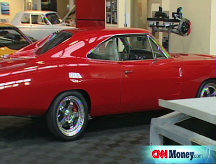Auto lenders feel squeezed
Rising loan delinquencies and declining car and truck sales have many lenders feeling the pinch.
NEW YORK (CNNMoney.com) -- The nation's automakers aren't the only companies suffering from higher gas prices and weak vehicle sales. Auto lenders are feeling the squeeze as well.
Rising unemployment and soaring gas prices have translated into increased loan losses for the auto loan industry, a market that analysts estimate to be worth more than $600 billion.
Plunging domestic vehicle sales in recent months have only compounded those woes as fewer sales typically means fewer loans. General Motors (GM, Fortune 500), the nation's largest automaker, reported a 20% decline in sales from a year ago Wednesday while Ford Motor (F, Fortune 500) said that vehicle sales plunged 27% during the month of August.
"The market grows and shrinks on a regular basis," said Melinda Zabritski, the director of automotive credit for Experian Automotive, a division of the credit bureau Experian. "Unfortunately we are going down into one of those troughs."
So far this year, there have been plenty of tales of woe across the auto lending landscape.
Credit card company Capital One (COF, Fortune 500), which is also one of the nation's top ten automotive lenders, saw profits in that division tumble by $4.4 million, or 11%, during the second quarter, as it saw an increasing number of loans go bad.
AmeriCredit Corp. (ACF), a pure play auto lender based in Fort Worth, Texas., reported a net loss of $150 million in its most recent quarter. Other smaller lenders have found it increasingly difficult to secure funding to make new loans.
"They just don't have the capital to lend like they used to," said Daniel Furtado, a San Francisco-based equity research analyst at Jefferies & Co. "This is leading to less people being able to purchase cars."
Some companies have bailed on auto lending altogether. In August, global banking giant HSBC (HBC) announced they would stop writing auto loans altogether in the United States.
Philadelphia-based Sovereign Bancorp (SOV, Fortune 500) said earlier this year it would no longer originate auto loans in the Southeast and Southwest, areas that are largely outside of its branch network.
Overall, the number of new auto loans are down more than 17% during the second quarter from a year ago, according to Experian Automotive.
Still, not all the news out of the auto lending industry is bad.
Most car buyers don't rely on the exotic type of loans that came back to haunt home buyers and mortgage lenders. Nor is anyone betting that the value of their vehicle will go up, which, in part, helped sink the housing market.
But as unemployment continues to climb and the broader economy remains weak, rising delinquencies could be the downfall of some auto lenders.
"Lenders are swamped with delinquent accounts right now," said Bobbie Britting, research director for consumer lending at research and advisory firm TowerGroup, which focuses on the financial services industry.
Many financial institutions will most likely try to find new ways to stem the tide of delinquencies by working with consumers. But given the size of the industry, even a modest increase in delinquencies could have a huge impact on auto lenders, notes Zabritski.
"We are going to see lenders retrenching and and developing whole new methods for lending," she said.
And just as housing industry experts have warned of more turmoil in the mortgage market, auto lending experts seem to suggest that more pain, rather than relief, lay ahead for this smaller, albeit important industry.
One worrisome sign is that roughly a quarter of the new auto loans that were originated in the first half of this year were from subprime and below-subprime customers, or borrowers with far from perfect credit, according to industry estimates.
At the same time, the average amount financed is up slightly from the same quarter last year, according to Experian Automotive, suggesting that lenders stand to lose more if an increased number of consumers are delinquent or default on their loans. ![]()


